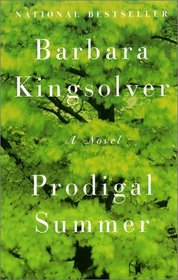Helpful Score: 11
I liked just about everything about this book beginning with the setting - the farms, mountains and remote wilderness areas of southern Appalachia in the summertime. In this beautifully written novel Barbara Kingsolver writes with fascinating detail about the lushness of the natural world, providing us with one amazing fact after another about how perfectly balanced nature is in terms of the food chain, prey and predator, and the way nature keeps reproducing itself from season to season, year after year unless we human beings interfere in the process. Set against this backdrop, Prodigal Summer tells the stories of three intriguing protaganists - each of them outsiders in one way or another, who are connected to each other in different ways. Their stories unfold along side each other under three separate chapter headings (Predators, Moth Love,and Old Chestuts) that keep reappearing throughout the novel as we gradually become aware of how their lives are connected. Ultimately, this is a novel about the way all things are connected to one another and how it is that for humans love - in it's many forms - is the strongest connection of all.
Helpful Score: 11
This novel is not so much plotted as woven, and the result is an intricate, sensual tapestry about every organism's drive to replicate itself. You may never look at a flower in quite the same light after you read this one! It's also the story of three women adapting to changes in their lives and returning to that dance of life when they thought they had left the floor. Outstanding, as Kingsolver's novels always are.
Helpful Score: 10
Couldn't make it past page 22. NOT my cup of tea. Its the first time I've ever not forced myself to finish a book I started. Too corny, even for me (and I like corny). Starts with a girl who secludes herself for 2 years from all people and lo/behold a handsome rugged man appears and why oh why does she feel a tingling in her loins? Could she really like this guy? Please. Sorry to Kingsolver fans, I've heard good things but for me it wasn't this one.
Helpful Score: 6
I like Barbara Kingsolver's novels, but I'm afraid to read her nonfiction because what if it's more preachy than her fiction is?
The woman can write, and I loved getting lost in the descriptions of western Virginia, and the earthy connections she makes between the reader and the scenes. At the same time, it's like she's the green movement's Ayn Rand. Her bad guys are laughable straw men (and here I'm thinking of The Poisonwood Bible in addition to Prodigal Summer), and her protagonists are both good and didactic.
Still, this narrative of three loosely connected people in one particularly rich fertile summer is a great read. And nature is a horn dog.
The woman can write, and I loved getting lost in the descriptions of western Virginia, and the earthy connections she makes between the reader and the scenes. At the same time, it's like she's the green movement's Ayn Rand. Her bad guys are laughable straw men (and here I'm thinking of The Poisonwood Bible in addition to Prodigal Summer), and her protagonists are both good and didactic.
Still, this narrative of three loosely connected people in one particularly rich fertile summer is a great read. And nature is a horn dog.
Helpful Score: 5
The "she" is Deanna Wolfe, a wildlife biologist observing the coyotes from her isolated aerie--isolated, that is, until the arrival of a young hunter who makes her even more aware of the truth that humans are only an infinitesimal portion in the ecological balance. This truth forms the axis around which the other two narratives revolve: the story of a city girl, entomologist, and new widow and her efforts to find a place for herself; and the story of Garnett Walker and Nannie Rawley, who seem bent on thrashing out the countless intimate lessons of biology as only an irascible traditional farmer and a devotee of organic agriculture can. As Nannie lectures Garnett, "Everything alive is connected to every other by fine, invisible threads. Things you don't see can help you plenty, and things you try to control will often rear back and bite you, and that's the moral of the story."





